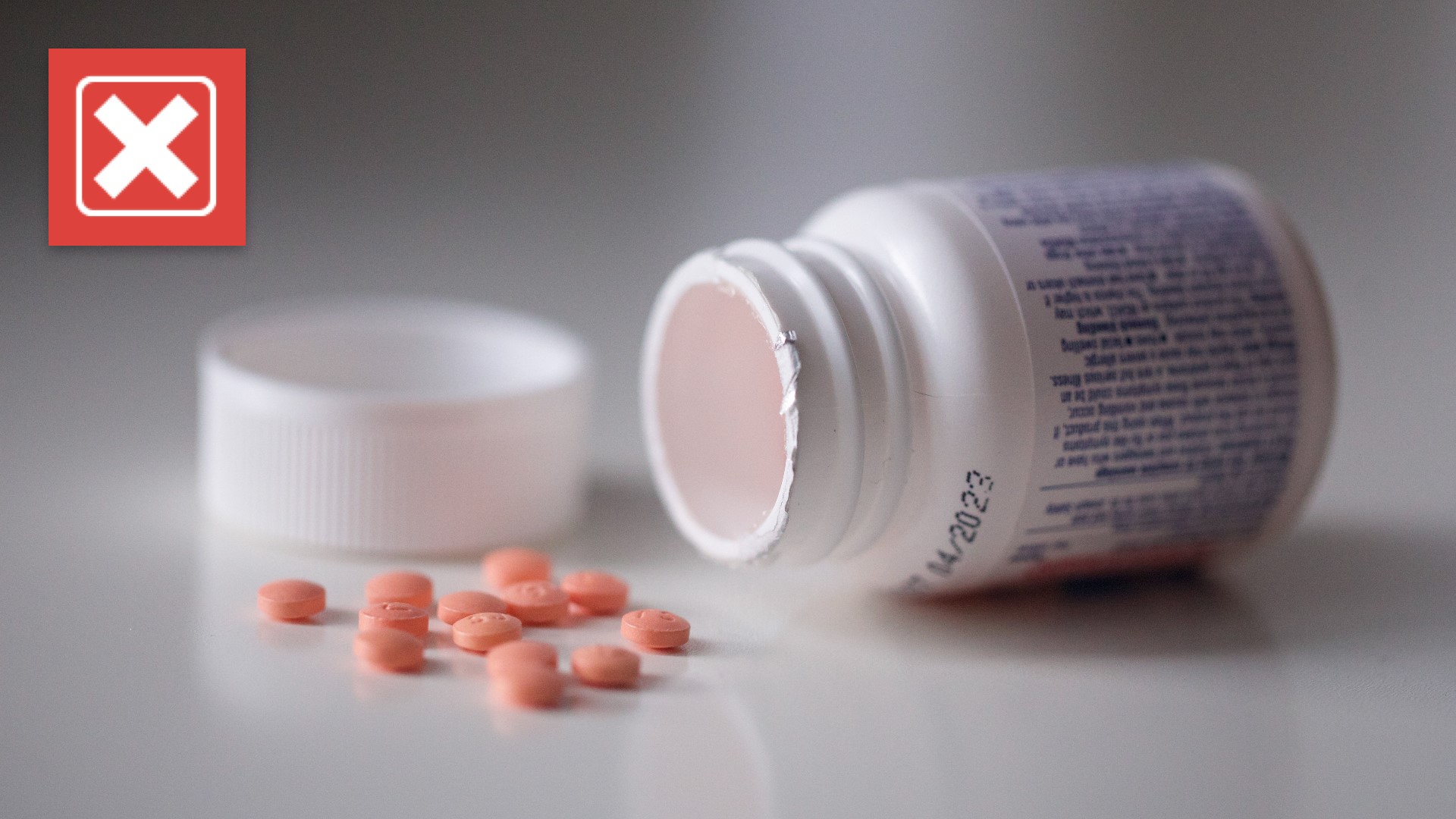Heart disease is the leading cause of death in the United States and accounts for about one in every four deaths, according to the Centers for Disease Control and Prevention (CDC). So, people often consider different treatments that could reduce their risk of heart disease.
Charles texted the VERIFY team, asking if taking low-dose aspirin could help with heart issues.
THE QUESTION
Is taking low-dose aspirin daily to prevent heart disease recommended?
THE SOURCES
- Dr. Don Lloyd-Jones, president of American Heart Association and practicing cardiologist
- Dr. Michael Kontos, cardiologist at Virginia Commonwealth University Health Pauley Heart Center
- U.S. Preventive Services Task Force
- American College of Cardiology
- Studies published in New England Journal of Medicine
THE ANSWER
No, taking low-dose aspirin daily to prevent heart disease is not recommended for most people.
Daily low-dose aspirin is recommended for certain adults who are at high risk of heart disease, or who have already had a heart attack, stroke or another heart disease. People should talk with a doctor before taking low-dose aspirin daily.
WHAT WE FOUND
The U.S. Preventive Services Task Force, an independent panel of experts in disease prevention, issued a draft recommendation on Oct. 12 updating its guidance regarding the daily use of low-dose aspirin to prevent heart diseases.
Under the draft recommendation, the task force says most adults should not take a low dose of aspirin daily to prevent first heart attacks or strokes.
Here’s a breakdown of the updated recommendations:
- Ages 40-59: People at high risk for heart disease and who do not have a history of heart disease should consult with their doctor about whether to start taking aspirin.
- Ages 60 and older: Should not start taking aspirin for heart disease or stroke prevention.
The recommendations don’t apply to people who are already taking aspirin and have had a heart attack, another type of heart disease, stroke or coronary artery disease, according to Dr. Don Lloyd-Jones, the president of the American Heart Association and a practicing cardiologist.
“You should stay on your aspirin as prescribed by your doctor, please don’t stop it,” he advised those people.
Lloyd-Jones told VERIFY that outside of the group mentioned above, most people should not take a low dose of aspirin daily.
“For preventing heart attack and stroke, most people do not need aspirin,” he said. “They should focus on making sure their blood pressure and their cholesterol are in a good range.”
While aspirin is often used to relieve pain, the American Heart Association says the drug also thins the blood and can help prevent blood clots that cause heart attacks or strokes. However, taking a low dose of aspirin daily can increase the risk of internal bleeding and sometimes be life-threatening, according to Dr. Michael Kontos, a cardiologist at the Virginia Commonwealth University Health Pauley Heart Center.
Under the U.S. Preventive Services Task Force’s previous guidance, which was released in 2016, beginning a daily low-dose aspirin regimen was recommended for people ages 50-59 who had a higher risk for heart disease and didn’t have an increased risk for bleeding. For people ages 60-69 with a higher risk for heart disease, the decision to start taking low-dose aspirin daily was “an individual one,” under the 2016 guidance.
While the updated task force recommendations are still considered a draft, Lloyd-Jones expects them to be adopted.
“They're not final, there is a public comment period through the middle of November,” he said. “But I fully expect they're going to actually end up looking exactly like they look today.”
Lloyd-Jones says the task force’s latest recommendations align with guidance from the American Heart Association and American College of Cardiology, which was updated in 2019.
So, why have these groups recently decided to change their guidelines regarding low-dose aspirin use?
It’s because treatment for risk factors related to heart disease has improved and changed the benefit-risk consideration, according to Kontos.
“Over the last 30 to 40 years, we've gotten much more aggressive about treating patients,” Kontos said. “And as a result, we've seen substantial reductions in patients with uncontrolled blood pressure, better cholesterol control, better diabetes control, and substantial reductions in patients that smoke. As a result, the benefit of aspirin has dropped off.”
Recent research has reached the same conclusion. Three studies (which can be read here, here and here) published in the New England Journal of Medicine in 2018 found that for most healthy people, the risks associated with taking low-dose aspirin daily outweighed the benefits.
The U.S. Preventive Services Task Force said new evidence since 2016 influenced its decision to update the recommendations.
“The latest information also shows a closer balance of benefits and harms than previously understood for people in their 50s and that starting aspirin use as young as 40 years old may have some benefit,” the task force said.
Kontos said it’s important for people to consider other things they can do to limit their risk of heart disease that doesn’t involve taking a low dose of aspirin daily. Exercising and eating healthy have substantial benefits.
“Make sure your blood pressure is controlled, make sure your cholesterol is controlled,” he said. “If you’re smoking, stop. Those are all much more likely to offer benefits with less overall risk than taking aspirin would be.”
Lloyd-Jones and Kontos said people should talk with a doctor before beginning a daily low-dose aspirin regimen.
More from VERIFY: No, you shouldn't take expired cold medicine

